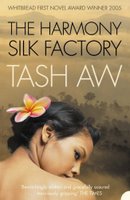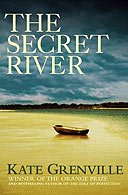TASH AW WINS 2006 COMMONWEALTH WRITERS PRIZE for BEST FIRST BOOK, SOUTHEAST ASIA & SOUTH PACIFIC
TASH AW has won the 2006 Commonwealth Writers Prize for Best First Book, Southeast Asia and South Pacific region, with his novel, The Harmony Silk Factory (Harper Perennial, 2005). Congratulations!
 What Regional Chair Professor Vijay Mishra of Murdoch University, Perth, Australia, says about Tash Aw’s The Harmony Silk Factory: “This is a beautifully crafted first novel that evokes both expatriate English and Chinese experience in colonial, Japanese-occupied Malaya. Early forties Malaya is presented as a kind of fantasia on themes of Malayan (later Malaysian) cultural life as interpreted by a writer of a younger generation looking back at his homeland. This is a passionate novel about love, betrayal, grief, loss and memory written from the perspectives of three narrators (a son, a wife and an expatriate colonial) each of whom is adrift in some way from his or her culture of origin. This an ambitious, imaginative, confessional, cross-cultural novel destined to become a classic of Malaysian fiction.”
What Regional Chair Professor Vijay Mishra of Murdoch University, Perth, Australia, says about Tash Aw’s The Harmony Silk Factory: “This is a beautifully crafted first novel that evokes both expatriate English and Chinese experience in colonial, Japanese-occupied Malaya. Early forties Malaya is presented as a kind of fantasia on themes of Malayan (later Malaysian) cultural life as interpreted by a writer of a younger generation looking back at his homeland. This is a passionate novel about love, betrayal, grief, loss and memory written from the perspectives of three narrators (a son, a wife and an expatriate colonial) each of whom is adrift in some way from his or her culture of origin. This an ambitious, imaginative, confessional, cross-cultural novel destined to become a classic of Malaysian fiction.”AUSTRALIA’s Kate Grenville won the 2006 Commonwealth Writers Prize for Best Book, Southeast Asia and South Pacific region, for her novel, The Secret River (Text Publishing, 2005). Congratulations!
 What Professor Vijay Mishra of Murdoch University, Perth, Australia, says about Kate Grenville’s The Secret River: “Kate Grenville’s The Secret River is an immensely powerful book that returns to the foundational moment of Australian settler history to rethink the nature of settler engagement with the land. There is guilt, trauma, triumph, and regret, all in a narrative that remains riveting and assured. The novel is almost majestic in its movement with the narrative moving inevitably towards the secret of the river (hence its title), the secret of Aboriginal massacre that haunts the lives of the settlers. Exploring a not uncommon theme of belonging and interracial relations, this novel implicitly makes a case for a silent compact between native owners and outsiders as the foundation of the nation. In this implicit compact the settler too establishes a claim to the land that has its own legitimacy. Kate Grenville writes a well-balanced story, neither hysterical nor evasive, but sympathetic and revealing. There is remarkable wisdom here, wisdom that seeps through every page of this outstanding novel.”
What Professor Vijay Mishra of Murdoch University, Perth, Australia, says about Kate Grenville’s The Secret River: “Kate Grenville’s The Secret River is an immensely powerful book that returns to the foundational moment of Australian settler history to rethink the nature of settler engagement with the land. There is guilt, trauma, triumph, and regret, all in a narrative that remains riveting and assured. The novel is almost majestic in its movement with the narrative moving inevitably towards the secret of the river (hence its title), the secret of Aboriginal massacre that haunts the lives of the settlers. Exploring a not uncommon theme of belonging and interracial relations, this novel implicitly makes a case for a silent compact between native owners and outsiders as the foundation of the nation. In this implicit compact the settler too establishes a claim to the land that has its own legitimacy. Kate Grenville writes a well-balanced story, neither hysterical nor evasive, but sympathetic and revealing. There is remarkable wisdom here, wisdom that seeps through every page of this outstanding novel.”


0 Comments:
Post a Comment
<< Home